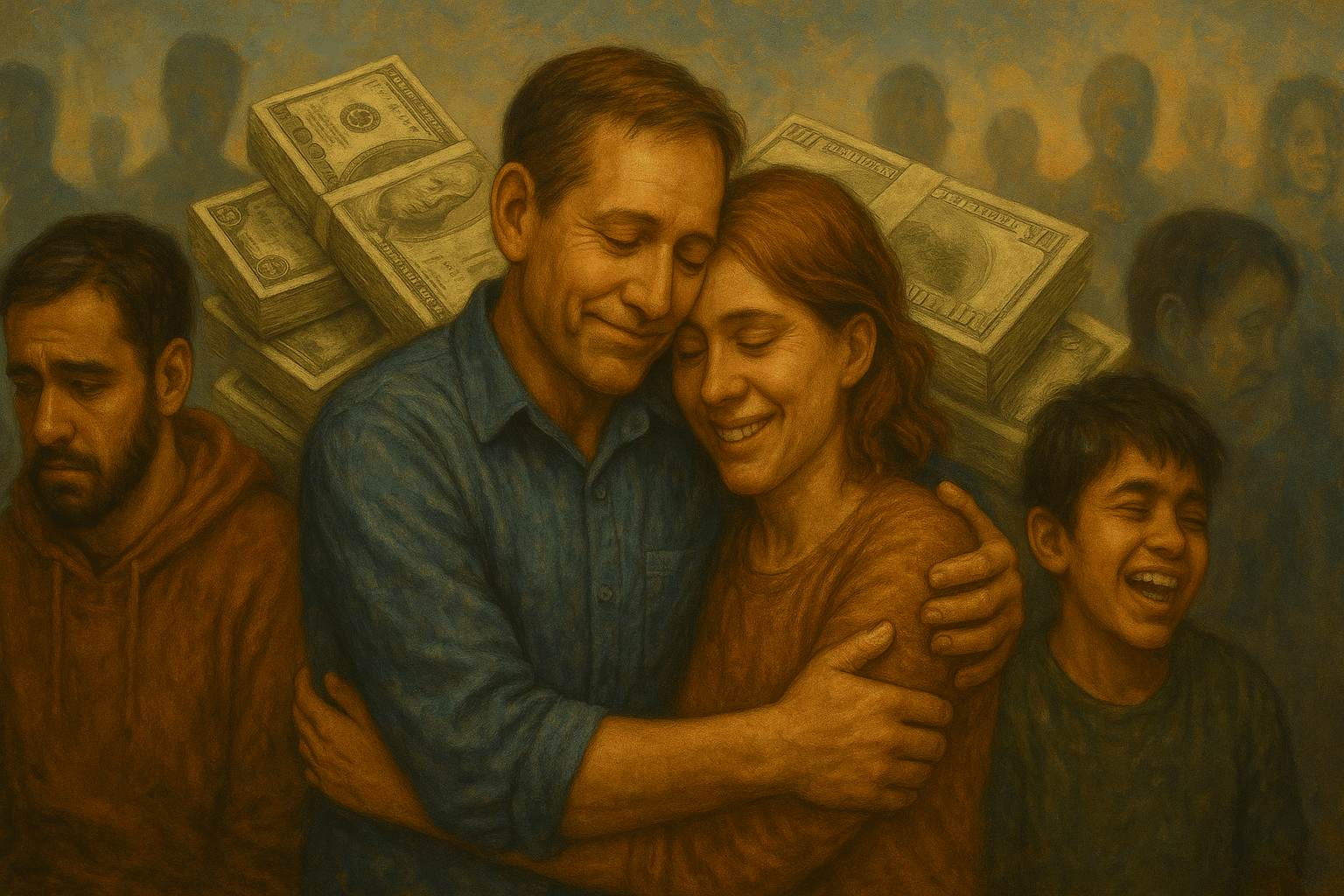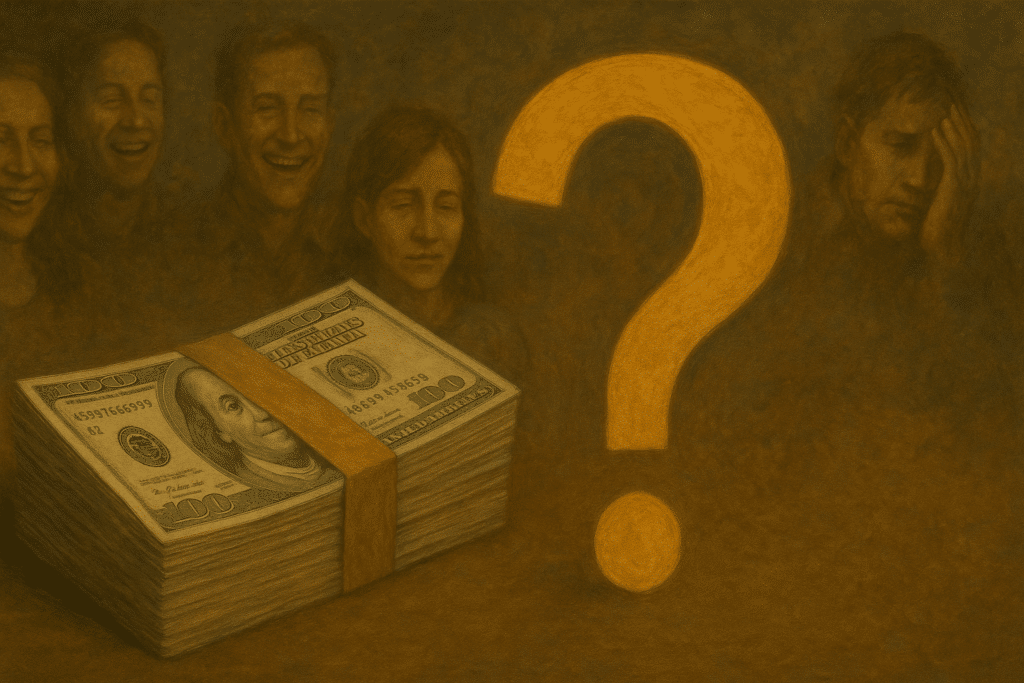Money arguably one of the most powerful forces shaping human civilization. Its influence spans across cultures, eras, and societies. From ancient barter systems to modern digital currencies, the evolution of money reflects humanity’s constant pursuit of value, convenience, and ultimately, a better life. Yet, a timeless question remains: “Can money buy happiness?”
This question is more than just philosophical. It’s a reflection of how society measures success, fulfillment, and emotional well-being. Many have argued that money cannot buy happiness, while others insist it’s a critical ingredient to a good life. In reality, both perspectives carry merit depending on how we define “happiness.”
In this article, we’ll explore the role of money in human life, its historical and societal significance, and how its influence intersects with the emotional fabric of human happiness both on an individual and collective level.
A Brief History of Money: The Evolution of Value
Long before paper bills, credit cards, or cryptocurrency, societies operated on barter systems. Goods and services were exchanged directly grain for tools, livestock for fabric. This system, while functional in small communities, lacked scalability. As trade expanded, so did the need for a standardized medium of exchange.
Enter gold coins, which not only held intrinsic value but were durable, portable, and widely accepted. Over time, coins evolved into paper currency, and then into the digital economy we live in today. Despite these changes, one constant remains: money represents the ability to acquire resources, secure shelter, support families, and unlock opportunities.
The Social Power of Money
From the earliest forms of currency to today’s stock markets, money has not just been about survival it has shaped hierarchies, influenced governments, and determined individual life paths. The wealthier an individual or nation, the more access they have to healthcare, education, security, and comfort.
Money, in this context, equals power. It dictates influence, choices, and lifestyle. It has the potential to build or destroy. And yet, despite this immense power, it cannot guarantee internal contentment.
Can Money Buy Happiness? The Materialistic Illusion
When people say “money can’t buy happiness,” they often refer to the fleeting nature of material pleasures. A luxury car, a designer wardrobe, or an expensive vacation might offer a temporary high. Over time, however, the novelty fades, and the emotional satisfaction that once felt so rewarding disappears.
This phenomenon is supported by research in psychology. Studies have shown that while income is correlated with happiness to a certain extent especially in alleviating poverty and ensuring basic needs its effect plateaus after a certain threshold. Once basic needs are met, additional wealth has diminishing returns on emotional well-being.
When Money Can Buy Happiness
Contrary to popular belief, money can, in fact, contribute to happiness but only when it is used in meaningful ways. Let’s consider a few scenarios:
1. Helping the Needy
Have you ever fed a starving person? Witnessed the raw, unfiltered gratitude in their eyes after giving them a warm meal? That feeling deep satisfaction, emotional connection, and a sense of purpose can’t be bought with material possessions. It stems from using money to uplift someone in genuine need.
2. Supporting Loved Ones
Consider the joy of gifting your parents something they’ve long desired or helping a sibling through college. The emotional fulfillment that arises from easing a loved one’s burden or fulfilling a need is profound. It’s in those moments you realize that money, when channeled selflessly, can buy something close to happiness.
3. Creating Opportunities
Entrepreneurs who build businesses often speak of the satisfaction that comes from employing people and changing lives. When you create job opportunities, you do more than generate income you create dignity, hope, and stability for others. That, too, is happiness earned through wealth used wisely.

The Real Source of Human Joy: Connection and Contribution
At our core, human beings are social animals. We are not built for isolation. True fulfillment often comes from our interactions with others building relationships, nurturing families, supporting communities, and leaving a legacy.
Ironically, the more we pursue individual happiness through selfish means, the more elusive it becomes. The joy of life doesn’t lie in possession, but in connection and contribution.
Money is not inherently evil or sacred. It is a tool a powerful one that can either serve others or serve only the self. It’s our intention and application that make the difference.
The Myth of Self-Centered Wealth
Society often celebrates wealth acquisition. Billionaires are idolized. Luxury is equated with success. But rarely do we question what happens behind the curtain.
Are the ultra-wealthy truly happier? Studies show that rates of depression, anxiety, and loneliness do not discriminate based on bank accounts. In fact, in some cases, those who acquire wealth without emotional grounding suffer more. They often battle existential emptiness, strained relationships, and identity crises.
This isn’t to say one must be poor to be happy but that wealth alone cannot guarantee joy.
Money as a Responsibility, Not a Goal
One of the most overlooked perspectives is viewing money not as a goal but as a responsibility. If you have financial resources, you have the capacity to enact change. Whether that’s through direct charity, empowering others, or simply providing for your family, wealth becomes meaningful when it is attached to purpose.
We must ask ourselves: What am I doing with what I have? How am I contributing to the world with my resources?
Why You Need Money (But Not in the Way You Think)
Let’s reframe the question: Instead of asking “Can money buy happiness?” ask, “Can I use money to live a more meaningful life?”
Yes, you need money. You need it to feed your children, to protect your health, to fund education, to give to the causes you believe in, and to experience the world. You need it not to serve your ego, but to serve your purpose.
Empty pockets can limit your ability to impact lives. But overflowing ones, if misused, can lead to a hollow existence.
So what’s the solution? Balance. Intention. Perspective.
Let Money Work For You "Don’t Work For Money"
This shift in mindset changes everything. Make money your servant, not your master. Use it to support your life, not define your worth.
When money is prioritized above relationships, time, and personal values, it becomes a trap. But when it’s a vehicle for your values whether that’s generosity, family, service, or innovation it becomes empowering.
The key is clarity. Define what happiness means to you. Then ask how money can support not replace that vision.
Conclusion: Reclaiming the Purpose of Wealth
To say that money is unimportant is naïve. To say that it guarantees happiness is equally misguided. The truth lies somewhere in the middle.
Money is a powerful resource. Used wisely, it can foster happiness not through self-indulgence, but through meaningful giving, creation, and connection. Used carelessly, it can disconnect, corrupt, and isolate.
So no money alone cannot buy happiness. But when used with compassion, vision, and responsibility, it can unlock the doors to a life filled with purpose, connection, and deep, lasting joy.



One Response
That is a good perspective